Portrait gallery Co-researchers
Anthropologists often unjustly conceal the role of their co-researchers and/or assistants. They may present texts produced by others as their own to the extent of plagiarism. This page wants to acknowledge the substantial contribution of friends and colleagues in my research over the years. It shows the co-production of our ethnographic work. Only the most prominent helpers are presented here. A more complete list of people who helped me in various ways would also include: Nana Boateng, Kwasi Anim, Michael Buabeng, Yaw Darko Ansah, Kofi Yeboah, Abena Ansah, Marek Dabrowski, Gregorz Kubowicz, Alex Awuah, and Abusua Panyin Daniel Osei Yeboah.
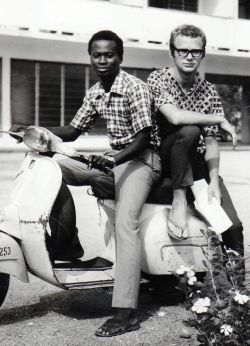
|
Kwasi Nimrod Asante-Darko became a close friend in 1970 when we both stayed in the same hall on the campus of the University of Ghana, Legon. When in 1971 I left for Kwahu-Tafo to do fieldwork for my master thesis, he joined me and we caried out the research together. We rented a small room in the house of the abusua panyin (lineage head) Kwaku Omari and for three months we shared nearly every minute of our lives, day and night. One evening we heard a lot of noise in the compound; a bitter conflict had arisen in the family. A woman, who was a member of the lineage, had suddenly died and the abusua panyin refused to acknowledge and bury her because of an earlier conflict. The case led to two days of heated discussion and negotiation during which the cracks of the kinship system revealed themselves. Kwasi follwed all the events and took extensive notes of what I was unable to follow. The event became the case from which my entire thesis evolved, a case study of one lineage, focusing on marriage and divorce, death and inheritance, and witchcraft accusations (Bleek 1975). Kwasi's contribution to my (not his!) thesis has been invaluable. Our common adventures in Kwahu started a life-long friendship and I named our first born daughter after him. After his university training he became a district commisioner in several places in southern Ghana until health problems forced him to retire and settle in his hometown Suhyen, near Koforidua in the Eastern Region. Kwasi died in 2016. His funeral was an impressive farewell. His impact on my life and work has been immense. [Photograph: Kwasi Asante-Darko and I as students at the university, 1971].
|
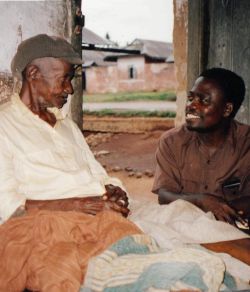 |
Kwame Fosu was a primary school teacher in Abetifi, not far from Kwahu-Tafo. He developed a keen interest in Akan culture and language and became a language instructor for foreign development workers and missionaries. He published several books and brought out a couple of audio cassettes on Akan culture. During a few years he had his own local radio programme on cultural issues, Tete wo bi (The past has something). When I began my research on meanings and experiences of growing old in 1994, I asked him to come and help me in the research, which he did with great skill and dedication for a period of four months. His accurate transcriptions and translations of our conversations with several older people and his extensive notes on these texts are the most precious documents in my field material. After that first period we occasionally met and had more discussions on various issues of life and culture in Kwahu. Kwame Fosu produced several cassette tape recordings of Akan/Kwahu culture and has been on an FM station in Nkawkaw for a number of years sharing about Akan/Kwahu culture. He has been teaching Twi for several years in Divine Word Language Centre in Abetifi. After DWLC closed he continued teaching Twi privately to a number of foreign students. He died in 2021. [Photograph: Kwame Fosu interviewing Nana Kwaku Agyei].
|
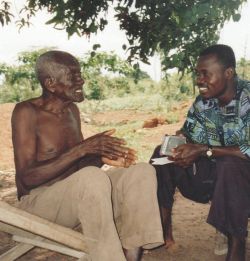 |
Samuel Sarkodie was a sociology student at the University of Ghana who in 1994 joined me during four months of my research among older people. One day we were discussing the possibility of doing participant observation as a patient in a hospital. He volunteered to try this and two days later he was 'admitted' to the nearby hospital of Atibie where he spent three days as a 'fake patient' (with the approval of the hospital authorities). The experiment resulted in a methodological article [pdf]. Not long after our common research, he left for the USA and I never heard from him again. [Photograph: Samuel Sarkodie interviewing Nana Kwadwo Gyima].
|
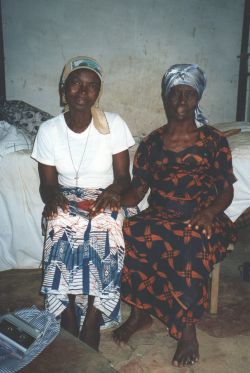 |
I met Monica Amoako in 1969 when Kofi Ron Lange (later: Kofi Yeboah) and I came to Kwahu Tafo to learn Twi. She was then working as a ward assistant in the local clinic. She became a wonderful friend who helped us in everything that newcomers to a culture may need. She was the only daughter of her mother and also had only one daughter herself. When I returned to the town in 1994 she had become a respected grandmother and the uncrowned 'queen mother' for many people, especially in the Catholic Church. She suggested her brother Patrick Atuobi as a research assistant (see below), helped me in my research by taking me to older people and led discussions with older women about sensitive topics. [pdf] Numerous times she acted as a key informant on women's affairs and general issues of family life and local politics. Around 2003 she offered me a room in one of her houses, which became my permanent accomodation. In 2005 I filmed the preparation of fufu in her compound (see under audio-visual productions). Monica died in 2019, aged 77.[Photograph: Monica (left) with Nana Yaa Asantewa] |
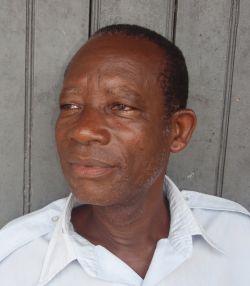
|
Anthony Yaw Obeng Boamah was a clerk at the Technical Institute at Kwahu-Tafo when I met him in 1994 and invited him to join me in the research. For some time he combined his work at the school with the research until he retired. Since then he has been deeply involved in the research till today. Boamah is also an amateur writer who published three short novels and wrote several more that he still hopes to get published. His novels show his interest in local traditions and how these change under the pressures of modern times. Boamah made many important contributions to the research; I benefited most from the many conversations we had together. He was also one of the authors of our publication Life, love and death. |
 |
Patrick Atuobi was trained as an agricultural teacher and was for some time teaching in the Technical Institute at Kwahu-Tafo. When I met him in 1995 he had stopped teaching and had become a farmer. I got to know him through his sister Monica Yaa Amoako who had been a good friend since I first visited Kwahu-Tafo in 1969. Patrick has since been involved in the old age research and several other smaller research projects and has contributed to countless conversations, observations, recordings and transcriptions. He was one of the authors of our publication Life, love and death. [Photograph: Patrick Atuobi on his farm]. |
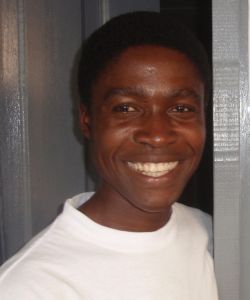
|
I 'discovered' Benjamin D. Boadu in 1994 when I settled in a family house in 1994 for my research on old age experiences. I was looking for someone who could type transcriptions and fieldwork notes, when I heard the sound of rapid typing from one of the rooms in the house. I found BD, as he is commonly called, working on an old typewriter. I asked him if he was interested to do typing work for me on a computer. He enthusiastically accepted and has been an constant colleague in our research team, not only as a typist, but also a key informant, adviser and sparring partner in discussions. He also became a close friend with whom I spent many hours of sharing experiences. He went on to do a bachelors in Publishing at the Kwame Nkrumah University of Science and Technology in Kumasi but was unable to acquire employment in that field. He is now teaching in the local elementary school. He recently had his first child, which he called after my son. |
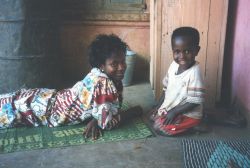
|
Abena Jo was staying together with her baby boy Kwasi in the house where I settled in 1994. When I asked her if she would be willing to cook for me, she responded enthousiastically. Since then she has been preparing the most delicious dishes for me and my guests and the entire research team. She continued to do so when I moved to another house. Kwame Fosu used to call her 'Matron' because of her domestic talents. Jo also helped in various other ways and was able to mobilize people in the house for any jobs to be done. [photograph: Jo with Kwasi in 1996] |

|
When in 1994, after an absence of 21 years, I returned to Kwahu Tafo to study meanings and experiences of growing old, I needed accommodation for my assistant Samuel Sarkodie and for myself. I found two rooms, which I redecorated together with a local carpenter. A young boy living in the house helped us and thus entered into my research and my life; he was Isaac Oppong. Isaac has remained a friend since. He developed an interest in photography and enjoyed taking pictures for me, especially of situations and activities, which we thought were more difficult or somewhat uncomfortable for me to photograph, e.g. sanitary activities and people lying in bed.[pdf] Isaac is now married and has one son. They live in Kwahu-Mpraeso. [Photograph: Isaac Oppong in 1995] |
| Return to Home | |